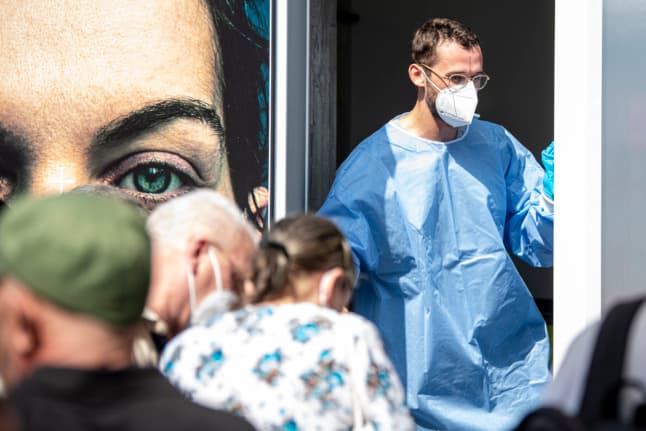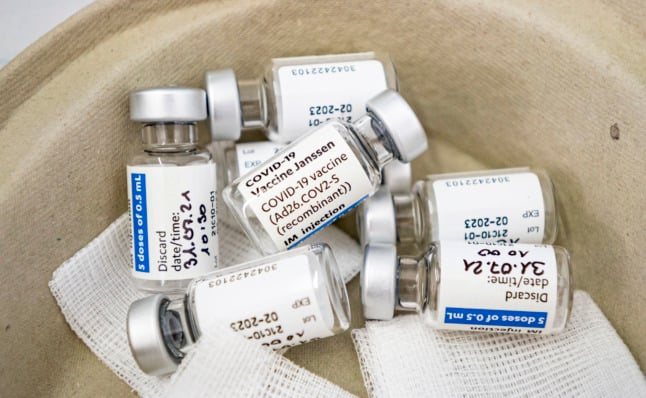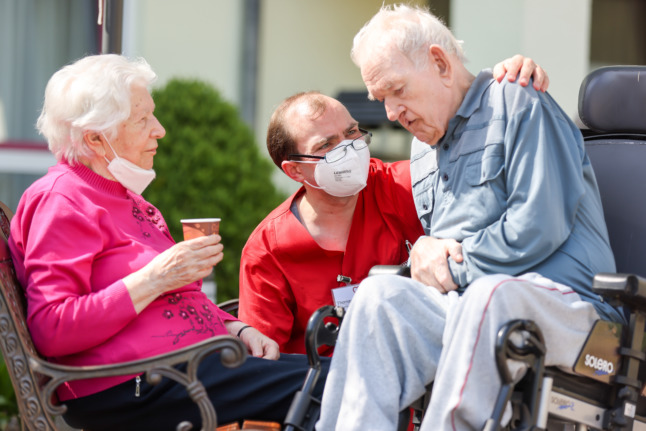Who's about to get a top-up Covid shot in Germany - and why?

The German government is set to hand out booster Covid vaccinations to certain groups of people from next month. We look at who's in line for a 'refresher' jab, and why authorities say they're needed.
What's happening?
At the Health Ministers' conference on Monday, German Health Minister Jens Spahn, of Angela Merkel's Christian Democrats (CDU), and his 16 state counterparts, resolved to offer booster Covid jabs to certain groups of people in Germany from September.
READ ALSO: Germany agrees to offer Covid booster shots from September
The additional shots will be carried out with one of the two mRNA vaccines - Pfizer/BioNTech or Moderna - and administered by local GPs and mobile vaccination teams.
According to Spahn, the idea is to give people who most need it additional protection from Covid over the autumn and winter months, particularly in light of the dominance of the highly infectious Delta variant.
READ ALSO: Covid infection rate in Germany goes up – but vaccines having an impact
Who's in line to get an additional shot?
At first, only specific groups of the population will be offered a third jab. The main group will be those who are considered to be especially vulnerable to being hospitalised with Covid-19.
This group includes the elderly, who have been shown to be much more at risk of death or hospitalisation from Covid, and people with chronic conditions that might affect their immune systems.
Announcing the decision from the Health Ministers' conference, Spahn said the step would be taken as a "precautionary measure" and that the jabs would be issued via mobile vaccination teams in care homes, assisted living facilities and other organisations that care for the elderly and vulnerable.
Other vulnerable people who don't live in a care home will be able to book their booster jab with their local doctor, or Hausarzt.
READ ALSO: EXPLAINED: Why vaccinated people in Germany are still getting Covid
Another group in line for an additional dose are those who have only been vaccinated with one of the so-called viral vector vaccines, meaning two shots of AstraZeneca or one of Johnson & Johnson. This group will likely have the chance to a get a top-up jab at their local GP's office from September onwards.

People who've had the Johnson & Johnson (aka 'Janssen') vaccine will be eligible for a booster jab after six months. Photo: picture alliance/dpa | Fabian Sommer
The ministers have stressed, however, that the additional jab is entirely optional, and that it should be taken at least six months after the last vaccine dose was administered.
As many people in Germany - especially younger people - have only recently been given their shots, their top-up shot isn't quite around the corner.
Will there be the chance for a booster jab in future?
The short answer appears to be yes - though we don't know exactly when. Back in July, the Health Ministry announced that it secured enough vaccine doses to give everyone in the country at least two booster jabs in 2022.
At the moment, though, it appears that ministers are keen to prioritise the people who need in most - especially light of rising infection rates and fears that the fourth Covid wave could peak sometime during autumn and winter.
READ ALSO: Germany to secure 204 million Covid vaccine ‘booster’ doses for 2022
Why is this needed?
According to Spahn, getting a third (or, in the case of Johnson & Johnson, second) jab is a "precautionary measure" that could offer additional immune protection for the people who most need it.
In the case of each of the Covid vaccines, the immunity built up during the first and second jabs can decline over time, so an additional dose could act as a top-up to increase protection once again.
This is particularly important for those groups who may already have slightly weaker immune systems, like older age groups, and people who've had organ transplants or cancer treatment.
According to the minister's resolution, recent studies have shown that the decline in immune protection "applies in particular to the group of relevant immunocompromised patients as well as to very old people and those in need of care".

Immune protection from vaccines is believed to decline more rapidly in the elderly and immune-compromised. Photo: picture alliance/dpa/dpa-Zentralbild | Jan Woitas
At present, the Standing Vaccines Commission (STIKO) hasn't yet issued a firm recommendation in favour of booster jabs, citing insufficient evidence about the benefits.
However, there have been some initial studies that suggest that mixing and matching an mRNA vaccine (such as Pfizer or Moderna) with a viral vector one (such as AstraZeneca or Johnson & Johnson) can produce a much stronger immune response than a viral vector vaccine by itself.
READ ALSO: Covid vaccine mix-and-match: Why is it so common in Germany – and is it safe?
The added protection could be all the more important as the weather gets cooler and infection rates start to climb.
What are people saying?
The news has mostly been greeted positively by German politicians, many of whom see effective and widespread vaccination as a route to reopening society.
Federal Minister for Families and Children, Christine Lambrecht (SPD), describe the plans for booster jabs as a "good and far-sighted decision".
"It's about keeping an eye on all generations equally and acting together decisively," she said.
Some immunologists have also expressed their support for the move.
Speaking to DPA, vaccines expert Lief Sander from Berlin Charité hospital said he believed that a general recommendation for an additional vaccine does could be on the horizon.
Though STIKO hasn't yet thrown its weight behind the idea, "widespread, rapid vaccination" of the most vulnerable is a sensible move, Sander said.
Comments
See Also
What's happening?
At the Health Ministers' conference on Monday, German Health Minister Jens Spahn, of Angela Merkel's Christian Democrats (CDU), and his 16 state counterparts, resolved to offer booster Covid jabs to certain groups of people in Germany from September.
READ ALSO: Germany agrees to offer Covid booster shots from September
The additional shots will be carried out with one of the two mRNA vaccines - Pfizer/BioNTech or Moderna - and administered by local GPs and mobile vaccination teams.
According to Spahn, the idea is to give people who most need it additional protection from Covid over the autumn and winter months, particularly in light of the dominance of the highly infectious Delta variant.
READ ALSO: Covid infection rate in Germany goes up – but vaccines having an impact
Who's in line to get an additional shot?
At first, only specific groups of the population will be offered a third jab. The main group will be those who are considered to be especially vulnerable to being hospitalised with Covid-19.
This group includes the elderly, who have been shown to be much more at risk of death or hospitalisation from Covid, and people with chronic conditions that might affect their immune systems.
Announcing the decision from the Health Ministers' conference, Spahn said the step would be taken as a "precautionary measure" and that the jabs would be issued via mobile vaccination teams in care homes, assisted living facilities and other organisations that care for the elderly and vulnerable.
Other vulnerable people who don't live in a care home will be able to book their booster jab with their local doctor, or Hausarzt.
READ ALSO: EXPLAINED: Why vaccinated people in Germany are still getting Covid
Another group in line for an additional dose are those who have only been vaccinated with one of the so-called viral vector vaccines, meaning two shots of AstraZeneca or one of Johnson & Johnson. This group will likely have the chance to a get a top-up jab at their local GP's office from September onwards.

People who've had the Johnson & Johnson (aka 'Janssen') vaccine will be eligible for a booster jab after six months. Photo: picture alliance/dpa | Fabian Sommer
The ministers have stressed, however, that the additional jab is entirely optional, and that it should be taken at least six months after the last vaccine dose was administered.
As many people in Germany - especially younger people - have only recently been given their shots, their top-up shot isn't quite around the corner.
Will there be the chance for a booster jab in future?
The short answer appears to be yes - though we don't know exactly when. Back in July, the Health Ministry announced that it secured enough vaccine doses to give everyone in the country at least two booster jabs in 2022.
At the moment, though, it appears that ministers are keen to prioritise the people who need in most - especially light of rising infection rates and fears that the fourth Covid wave could peak sometime during autumn and winter.
READ ALSO: Germany to secure 204 million Covid vaccine ‘booster’ doses for 2022
Why is this needed?
According to Spahn, getting a third (or, in the case of Johnson & Johnson, second) jab is a "precautionary measure" that could offer additional immune protection for the people who most need it.
In the case of each of the Covid vaccines, the immunity built up during the first and second jabs can decline over time, so an additional dose could act as a top-up to increase protection once again.
This is particularly important for those groups who may already have slightly weaker immune systems, like older age groups, and people who've had organ transplants or cancer treatment.
According to the minister's resolution, recent studies have shown that the decline in immune protection "applies in particular to the group of relevant immunocompromised patients as well as to very old people and those in need of care".

Immune protection from vaccines is believed to decline more rapidly in the elderly and immune-compromised. Photo: picture alliance/dpa/dpa-Zentralbild | Jan Woitas
At present, the Standing Vaccines Commission (STIKO) hasn't yet issued a firm recommendation in favour of booster jabs, citing insufficient evidence about the benefits.
However, there have been some initial studies that suggest that mixing and matching an mRNA vaccine (such as Pfizer or Moderna) with a viral vector one (such as AstraZeneca or Johnson & Johnson) can produce a much stronger immune response than a viral vector vaccine by itself.
READ ALSO: Covid vaccine mix-and-match: Why is it so common in Germany – and is it safe?
The added protection could be all the more important as the weather gets cooler and infection rates start to climb.
What are people saying?
The news has mostly been greeted positively by German politicians, many of whom see effective and widespread vaccination as a route to reopening society.
Federal Minister for Families and Children, Christine Lambrecht (SPD), describe the plans for booster jabs as a "good and far-sighted decision".
"It's about keeping an eye on all generations equally and acting together decisively," she said.
Some immunologists have also expressed their support for the move.
Speaking to DPA, vaccines expert Lief Sander from Berlin Charité hospital said he believed that a general recommendation for an additional vaccine does could be on the horizon.
Though STIKO hasn't yet thrown its weight behind the idea, "widespread, rapid vaccination" of the most vulnerable is a sensible move, Sander said.
Join the conversation in our comments section below. Share your own views and experience and if you have a question or suggestion for our journalists then email us at [email protected].
Please keep comments civil, constructive and on topic – and make sure to read our terms of use before getting involved.
Please log in here to leave a comment.